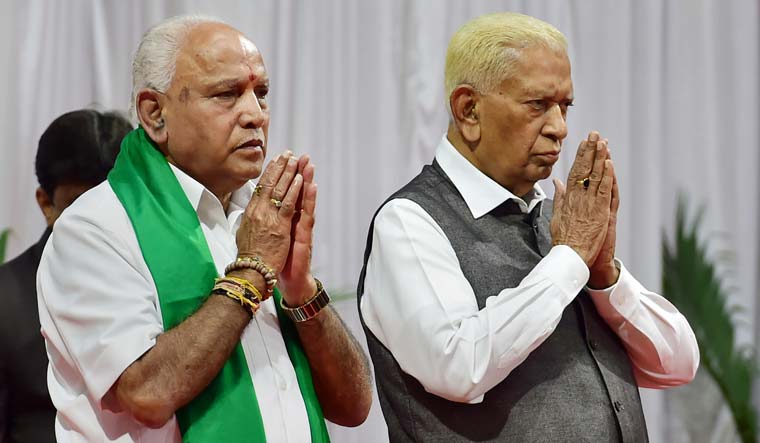In 2004, the BJP emerged as the single largest party in Karnataka, but the Congress and the JD(S) allied to make Dharam Singh the chief minister. In 2006, JD(S)’s H.D. Kumaraswamy did a number on the coalition and parted ways with his father H.D. Deve Gowda, withdrawing support to the Congress. CM Singh had to resign. Kumaraswamy joined hands with the BJP, and formed a power-sharing deal. The parties would share chief-ministership on a 20-month rotation basis, with Yediyurappa the deputy chief minister in the first term. But, in October 2007, after Kumaraswamy's chief ministership term ended, troubles arose again—there were issues in handing over the chief minister post and the coalition fell. By December 2007, president's rule was announced.
Now, history starts to echo. In the 2008 assembly elections that followed, BJP became the single largest party, but fell three short of majority. Yediyurappa became chief minister again, enlisting the support of six independents, but decided to support his wobbly position by embarking on what was then dubbed 'Operation Kamal'. Seven legislators—four from the Congress and three from the JD(S)—resigned from the posts and joined the BJP, thus circumventing the anti-defection law, and facilitating fresh bypolls in 2009. The BJP, with its new inductees, won five seats in the polls. The lotus had bloomed in the South for the first time. Speaking to a national magazine, Yediyurappa defended his move: “This was an inevitable step because the opposition was trying to dislodge my government and I had to defend it.”
But, nobody remembers what happened next better than Yediyurappa.
2019 bypoll results
15 assembly constituencies went to bypolls on December 5, with the results set to be announced today. The bypolls were necessitated after the resignation and absence during the trust vote of 17 Congress-JD(S) legislators, which led to the collapse of the H.D. Kumaraswamy headed coalition government and paved the way for BJP to come to power. The 17 legislators were subsequently disqualified by the then speaker K.R. Ramesh Kumar. However, the Supreme Court heard the MLA's petition challenging the disqualification last month, and allowed them to contest the bypolls. The bypolls were earlier slated for October 21, but the EC had deferred them to December 5.
The stability of B.S. Yediyurappa government will be at stake if the party fails to win at least six of the 15 seats. At present, BJP holds 105 seats in the assembly with a current strength of 207, and has the support of independent MLA and minister H. Nagesh.
Currently, exit polls have put the BJP in a very strong position. Polls by local news channels and agencies predicted the BJP getting a clear majority winning 9-12 of the 15 seats, the ruling party leaders are confident the government would complete its term. On the eve of counting, Yediyurappa told reporters here that his party would win at least 13 seats.
Would a victory suffice?
Inspite of all his efforts in 2008-09, Yediyurappa couldn't remain chief minister for a full term. He had to resign in 2011. First came anger within his own party members for the positions and priviliges being accorded to the turncoats. Then came rebellion within his own ranks. From a period of 2008-2011, he faced almost three floor tests. The powerful Reddy brothers from Bellary—inspite of the chief minister bowing down to their every demand—went on a warpath. Yeddyurappa faced a political coup staged by mining magnate G. Janardhana Reddy in September 2009, after he ferried more than 60 BJP MLAs to Hyderabad and Goa seeking his ouster at a time when most parts of North Karnataka was devastated by floods following heavy rain, according to PTI. He was forced to remove close aides like Shobha Karandlaje, and he wept in front of TV cameras at his situation.
In 2010, 11 BJP rebels and five independents, who supported his government, wrote to then governor H. Baradwaj, withdrawing support. In 2011, the BJP central leadership finally pulled the plug on his reign.
Yediyurappa is currently the shortest serving CM on record (two days). In 2007, at one point of time, he managed to served only seven days before finding the rug pulled underneath him.
A victory or defeat in the bypolls, nobody knows the weight of history better than Yediyurappa.
How are the bypolls stacking up
The 15 constituencies that will go to the bypolls are Athani, Kagwad, Gokak, Yellapur, Hirekerur, Ranibennur, Vijayanagar, Chikballapur, KR Puram, Yeshwanthpur, Mahalakshmi Layout, Shivajinagar, Hoskote, KR Pet and Hunsur. While most of the constituencies going for the bypolls face a direct contest between Congress and BJP, in the southern parts of the state, JD(S) comes into the picture, making it a triangular fight. The Congress and the JD(S) parted ways after the collapse of the H.D. Kumaraswamy ministry in July.
BJP faces dissidence within as aspirants expressed displeasure, but attempts were made to pacify them by making them heads of boards and corporations. At Hoskote, Sharath Bachegowda rebelled (now a candidate supported by the JD(S)), leading to to his expulsion, while, in Kagwad, BJP's Raju Kage joined Congress and is now its candidate. There was rebellion in Vijayanagara and Gokak too. In the midst of all this, Congress's Dinesh Gundu Rao claimed disqualified Congress legislators like Byrathi Basavaraj, S.T. Somashekar and Munirathna—now BJP candidates—said they wanted to re-join the party, a request which was turned down.


